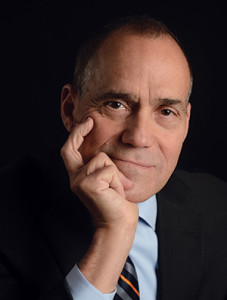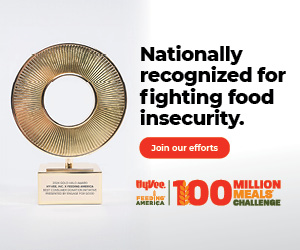 Called to the ‘Ministry of Healing’
Called to the ‘Ministry of Healing’
By Dr. Richard Deming as told to Christine Riccelli
The medical director of Mercy Cancer Center, Richard Deming, M.D., has been widely recognized both locally and nationally for his advocacy of compassionate patient care. Deming, 62, also is the founder of Above + Beyond Cancer, a nonprofit group that organizes active and challenging trips for cancer survivors, such as climbing to Mount Everest’s base camp. Here, in a conversation condensed by dsm Editor Christine Riccelli, he reflects on what being a doctor has taught him about adversity and growth, suffering and joy, and the “final threshold.”
Be Happy With What You Have
I grew up in itty-bitty towns in South Dakota. My dad worked at a grain elevator, and my mom was a checker in a grocery store. I was one of three children—we were Tom, Dick and Harriett. I am not making that up.
The wonderful thing about growing up in small-town South Dakota in the 1950s is that we had every possible thing we needed because we didn’t have a clue about what we didn’t have. Looking back, I realize that we were probably lower middle class, but there wasn’t a huge distinction between the haves and the have-nots.
Adopt the Buddhist Concept of ‘Not Knowing’
When I was in fifth grade, we moved to Madison in South Dakota, which had about 5,000 people—a huge town to us. It was here that I really started to have an identity and understand that I was a good student, that I liked learning and mastering academic subjects. Excelling in school gave me a sense of purpose.
When I was a junior in high school, my mom was diagnosed with cancer. Knowing what I know now, it was clearly an incurable cancer. But this was in the late 1960s, and cancer was talked about in hushed tones. Because my mom presented with some personality changes, the first diagnosis was mental illness. She was put into the state mental hospital near Yankton. I remember my brother and me driving down to it—it was kind of like a big old haunted house.
After she was there for a couple of weeks, one of the doctors recognized her symptoms, and she was sent to the Mayo Clinic in Rochester, Minn. Lo and behold, the cause of her personality changes was a brain tumor; it was metastatic cancer from lung cancer. She had multiple surgeries and radiation and ultimately died when I was a second-year medical student.
I didn’t go to college, though, with the idea I was going to be a doctor. I excelled in math and science at South Dakota State, but I didn’t have a real concept of what my career would be. The Navy offered me a scholarship to go to Creighton Medical School in Omaha, and I accepted it. I graduated first in my class.
I say this not to brag but because I believe that one way of approaching almost everything in life is with the Buddhist concept of “not knowing.” For centuries, people were certain that the world was flat, and that turned out to be false. And in the practice of medicine, we go through periods where we’re certain that things are true and they turn out not to be true. So rather than approaching things as if I absolutely know the answer and I’ll show you my credentials to prove it, I approach my work and my life knowing that our understanding of the world changes. We acquire knowledge, but over time we learn that some of that knowledge is proven to be not true. Wisdom, however, is a result of our life experiences. Unlike knowledge, wisdom is eternal.
Get Physical
At Creighton, I started running as a first-year medical student. If you’ve got a little bit of OCD and you get on a track, the idea of running laps is appealing. That was the beginning of the part of my life that recognizes vigorous physical activity as an important part of a well-rounded, healthy lifestyle. Prior to that, I had always thought of myself as an academic.
When I graduated from medical school, I went to San Diego to do my internship in the Navy. The way being a Navy doctor worked back then was that once you finished your internship, you did an operational tour. I was accepted to be part of the undersea medicine class, which trains you to take care of sailors in submarines and the diving community. One of the perks is I got to become a full-fledged Navy scuba diver.
I was then assigned to be the diving medical officer for an explosive ordnance disposal group in Hawaii. During this time, I not only got involved in scuba diving but also in running and cycling, and that reinforced my understanding that being outdoors and engaged in physical activity is vital to overall quality of life.
Be Authentic
When I finished my time as a diving medical officer, I started my radiation oncology residency at the University of California, San Francisco, then went to the National Cancer Institute and the National Naval Medical Center in Bethesda, Md., where in 1989 I finished my obligated time in the Navy. That’s when I moved to Des Moines.
Coming to Iowa was in many ways like returning to my roots. It felt very comfortable. Mercy was just starting its radiation oncology program, which became the beginning of the Mercy Cancer Center. I knew it was an opportunity to be part of something from the beginning, to help influence the center’s culture.
What started off for me as a career in medicine has become a ministry of healing. I realized that I didn’t want to live a life that was compartmentalized, in which I have one persona at work where I speak and act in this authoritarian manner and another when I’m not at work, when I’m someone who runs and skis and interacts joyfully. At some point, it became clear to me that it was artificial to set up walls between the different parts of my life.
Interacting with patients as an authentic individual who cares about people has great therapeutic benefit for the patient. And what’s become even more obvious to me is that such a relationship is also tremendously healing for the physician.
I think the Dalai Lama said it best:If you want others to be happy, practice compassion. If you want to be happy, practice compassion.
To avoid burnout, I think some physicians feel more comfortable walling off their emotions, but I think that is more likely to cause burnout than actually feeling emotion and acknowledging that you care deeply about your patients.
Embrace Your Mortality
Let’s put it on the table: When we’re talking about being a cancer doctor, we’re talking about dealing with death and dying. Even if a patient is diagnosed with an early-stage cancer that has a 95 percent cure rate, cancer reminds you in very visceral terms that you’re going to die someday and that you don’t know when that’s going to be.
But cancer also reminds us that it’s a blessing to be alive today. Death ends up not being a future failure or something to be fearful of but a motivator—a call to action to live today to the fullest. The more we can be present in the moment, the more peace and joy we will experience in our life.
Maintain Perspective of Your Place in the World
I ski with an extreme skier who taught me that if you’re not living on the edge, you’re taking up too much space. I love encouraging people to reach above and beyond what they think they can do; if you don’t, you have no idea what you’re capable of.
But though I’m always pursuing things to the fullest—trying to go farther, faster, higher—I’m aware that it’s not all about me. I heard this wonderful [parable]: We should all carry two messages. In one pocket, the message says: “You are special. Today is yours and there’s nothing you can’t do.” And in the other pocket it says: “You are a mere speck of dust, inconsequential in this universe, and when you’re gone, no one will ever know you were here.” How do you live your life knowing both are true?
As I interact with patients or friends, a part of me wants to bring the best out of everybody, but a part of me also realizes that you don’t always need to be in charge and that we’re all part of one interconnected universe. There’s not a single thing that any one of us has done in our lives totally by ourselves that’s worth a hill of beans. Anything that we’ve accomplished of any true measure is something that has required the effort of lots of people.
Turn Adversity Into Growth
As the cancer center director, my goal is to have a center that helps patients and families come through this adversity not forever negatively affected but with a sense of growth that allows them to better face life and understand who they are, whether they’re cured of their cancer or not.
I’ve learned that the difficult things in life can teach us what we’re capable of doing. If you deal with the difficulty in a healthy way and have the correct support and resources, you come through it with a greater sense of confidence, courage and resilience.
Most people have heard of the concept of post-traumatic stress; it’s when, in dealing with a difficult time, you are less prepared to deal with normal life and difficulties in the future. The opposite also is true—post-traumatic growth. If you receive the right resources and support, you can come through the difficulty—whether it’s cancer or something else—with a greater ability to deal with problems in the future.
Be Inquisitive About the ‘Final Threshold’
Having been fortunate to travel to many places in the world and experience many cultures, I’ve become certain that whether you call it religion or spirituality or a higher purpose, it is one and the same for everyone. And having an understanding of that energy—that God, if you will—can provide strength, hope and comfort as we journey along this path where there are a lot of unknowns.
When it comes down to it, the reason we call it “faith” is because there is no science that proves the mystery of what happens as one goes through the final threshold.
I have been present with many of my patients as they have taken their last breath, and no matter how religious one might be, there are some questions and some doubts. That’s where faith comes in.
I also think inquisitiveness about the world is an important trait for individuals to have. And part of that inquisitiveness is to be inquisitive about that final threshold. The bravest individuals I know are those who want to be fully present to experience their journey through this final threshold.
Understand the Relationship Between Suffering and Compassion
So I’m climbing Mount Kilimanjaro (in 2012) with Father Frank Bognanno (of Des Moines) and I’m sort of riffing on the relationship between suffering and compassion, and he says, “You know, Doc, if you spoke Latin, you’d know that ‘compassion’ literally means ‘with someone suffering.’ ”
So it’s our own suffering that allows us to recognize suffering in others and respond to it by being present with their suffering—compassionate and empathetic. Just as there’s a high and a low, and light and dark, there’s suffering and compassion in the world.
To wish someone a life that has no bumps in their road is not wishing them a fulfilling life. Number one, it’s not possible. And number two, you would not want to live a bump-free, flat existence. It’s those bumps that teach us what we’re all about—and, in a way, they represent our greatest strengths.





Show Comments (1)
Mark Ibsen
Well spoken. Thank you.
Comments are closed.